How to keep my cat from killing birds
Does anyone have any secrets for how to keep their cats from killing birds around their house. My cat hasn't done it yet but I can tell he's getting closer. I really don't want to give him a bell collar since I don't want to hear him ringing all day long all over the house (not to mention I do like it when he kills mice in the house).
Any other advice for how to save my neighborhood birds?
Comments (91)
lajollalady
10 years agoas noted in previous posts, this is a controversial topic. however, i'm amazed by the lack of respect shown by both sides. a 25 lb bell? oh well if birdie becomes lunch? how about this, people can exist happily together and have different points of view (indoor vs. outdoor cats) if they actually WANT to respect each other. it seem to me that the person who started this link actually WANTED to make amends for their cat killing a bird - this is how I too found this discussion, and yet the advice focused on berating them for their lifestyle/view. my cat was abandoned, she spent months outdoors, i know because i contacted the original owners, so she is a real outdoor cat, plus our apartment is tiny. additionally, she acts as the neighborhood mayor and is very affectionate - she gives many neighbors pleasure / cuddles (possibly in the hopes of a snacky snack, but hey that is a cat for you).
since you can't CHANGE people, nor should you want to if you have respect for each other, how about advising owners of bird killers about what they can do to make amends for every bird killed? it appears that we can't feed birds in our yard (which was my initial thought, make amends by increasing the bird population by providing food), but perhaps we bird killer owners could give $$$ to a bird sanctuary? or feed the birds in a neighbors yard?
rather than insisting that someone have your viewpoint, can't we find a way to live together and keep our way of life? perhaps not an "eye for an eye", but some "punishment" that fits the crime? isn't there SOME task other than becoming something that we are not that will appease the (indoor cat owner/dead bird) gods?
dreamgarden
10 years ago"lisa11310 (My Page) on Tue, Jun 12, 12 at 0:39
You have gotten some very respectful answers on a very HOT topic. My answer is your cat should not be outside unattended, not only for the birds sake but that of your cat to. I love cats and have 4 of my own (indoor only). I also have a bird sanctuary & small pond outside and am furious when others allow their cats to wonder and invade my property. I have the right to a cat free yard! Thank you for being concerned, but unless you have a need for a cat outside (as in a barn cat) they should be kept in."
This is a great comment. I completely agree with it.Related Professionals
Anchorage Architects & Building Designers · Universal City Architects & Building Designers · Barstow Interior Designers & Decorators · Rosaryville Interior Designers & Decorators · Miami Furniture & Accessories · Fair Lawn Furniture & Accessories · Norwalk Furniture & Accessories · Glendale Heights Cabinets & Cabinetry · North Bay Shore Cabinets & Cabinetry · Albuquerque Flooring Contractors · Hudson Flooring Contractors · Lincoln Flooring Contractors · Orem Flooring Contractors · Powder Springs Flooring Contractors · Scottsboro Flooring Contractorsms_minnamouse
10 years agoI agree with that also. We have some cats roaming at large on my property. Not my cats. They make my dogs bark, leave dead and dying wildlife around (I've also created natural habitats for WILD life), leave crap on my walk way and are nuisances in just so many other ways. They're not my pets, I don't know why I should have them forced on me.
Ennis39
9 years agoI have a simple and inexpensive solution that the cats tolerate quite well. I tied 4 brightly colored ribbons onto their collars. Cut them short enough so that they don't get into the food when the cats are eating. I try to turn the collar so the ribbons are on their topside when I feed the cats. I avoided red ribbons because hummingbirds apparently are attracted to red. When the ribbons get dirty, wash them or get put on new ones. The kitties look very cute and don't seem to be bothered by the Bird Awareness Ribbons. We haven't seen any feathers in the yard since the ribbons went on over 9 months ago.
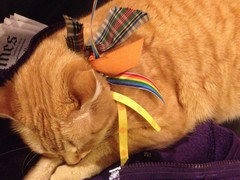
suzieque
9 years ago"Once a kitten reaches a year old, it is smart enough to stay safe. For this reason, we don't have them neutered until they are 8-12 mos. old."
I have no idea what this means. What is the reason that you don't have them neutered until they're 8 to 12 months old? What does learning to be safe have to do with being neutered later than the maturity age? And, by the way, your cats must be having a litter after litter of kittens if you don't have them neutered until then.
ryseryse_2004
9 years ago"Once a kitten reaches a year old, it is smart enough to stay safe. For this reason, we don't have them neutered until they are 8-12 mos. old."
We can barely afford the neuter fee so like to make sure the cat is going to be alive and kicking for awhile before we invest. ($200 here ----- or a 4 hr. round trip to the city for $35 ea.)
User
9 years agoIf you can't afford to neuter a cat, you simply shouldn't have one. And I wish whomever hadn't resurrected this thread.
Kristoffer343
9 years agoCats are predators, and they are biologically coded to catch and kill mice and small birds.
I don't think there's much you can do to stop this behavior if you are not okay with your cat wearing a little bell.
An outside cat enclosure would probably do the trick, but that would cost a bit. Besides, I, for one, wouldn't want to keep my cat locked in cage.
User
9 years agoMy cats could care less for the bigger birds (cockatiels)...not interested at all!, no problem!
But my wannabe huntress is fascinated with smaller birds (canaries and finches). She definitely has gotten better though over the years. I do note that she is less interested in any bird in a cage than one outside...they both have very limited and supervised outdoor time. If they are adequately stimulated, they will leave the caged birds alone...in my experience.
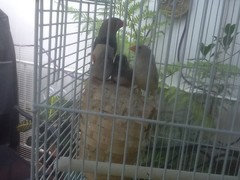
ryseryse_2004
9 years agoSomeone here said 'if you can't afford a cat, you shouldn't have one'. Hmmm ---- we never went out of our way to get a cat. People drop them off because we are a farm and they just figure we will take care of them. We do. And we absorb the expense if we can.
But as far as cats killing birds - the weak will become lunch. Cats can't fly.
User
9 years agoI'm curious if anyone has tried a cat bib? They look ridiculous but if it works, that's all that matters. Yes it can be harmful to keep cats outside but that is not what the originial poster asked about. I'm a bird lover and If this thing works it would be a great solution to OP's problem.
http://catgoods.com/catbib-sizes/
Anyone try this?
Here is a link that might be useful: Cat Bibs
ryseryse_2004
9 years agoTransport them to the pound so they can die there? Dead cats OK, dead birds, NOT. No, we have them neutered and they are fed and in return, they keep the farm free of rodents which are very damaging to machinery.
Once in awhile, a young cat who is not yet 'street smart' becomes lunch for a coyote. Coyotes have to eat too. A smart bird will not be eaten by a cat (birds fly). A smart cat will not be eaten by a coyote (cats climb trees.)
ms_minnamouse
9 years agoDomestic cats are NOT a native species and are NOT part of the evolutionary food chain. The a native wildlife haven't co-evolved to them, and since you admitted that you're caring for them, that means these cats have calories to spare, which means more energy than the native fauna.
Stop being selfish and allowing your alien species to slaughter the wildlife. The wildlife already has enough problems thanks to people.
judyj
9 years agoBell the cat, it's that simple.
No matter what any one thinks, cats will get out of the house. They want to and they will do whatever they can do to get out in the summer. All of our cats are "indoor" cats, but this summer, two have sustained injuries-bites-from who-knows-what. Another reason for keeping them current with vaccines-at the least, Rabies. Doesn't matter where you live either.
Something you need to be aware of-if the cat has never had a rabies vaccine-ever-then in Colorado, it's doomed to death. No exceptions.
But, not stay off topic, BELL the cat. And if you have any control-don't let put them outside.
Best,
JudyUser
9 years agoEchoing Minnamouse. Cats are not native to this area and are decimating wild bird populations. As for judy's declaration, my cats NEVER got outside.
Many of us here actually pay to provide our animals with basic health care- and to me, that includes spay/neutering. If you can't afford to give an animal basic care- spay/neuter, rabies, distemper vaccinations...or take the poor critter in when it's leg is broken or whatever...then, yes. The animal would be better off in the pound.
annkh_nd
9 years agoMy Mom had cats for years, and they never went outside. One must be careful going in and out the door, of course, but it can be done.
Our neighbors' cat does go outside - on a lead. He can get himself tangled in the shrubbery or stair railing, so of course they supervise him when he's outside. Like my Mom, they are mindful of the cat when they go in and out. They have to do this anyway, for their beagle - who is much more difficult to catch than the cat.
User
9 years agoannkh, of course it can be done, as you have demonstrated. I did take my end stage renal kitty outside, too...but all she nibbled on was the salad bar.
Judy, putting a bell on the cat means nothing to native birds. They don't know a bell from a hole in the ground. Why on earth would they be alarmed from a bell?
I have land in a very rural area with tons of native birds...they don't react at all to human sounds, actions...why would they respond to a bell on a cat?
mkitty1st
9 years agoI have feral cats that ended up under my house when the yacht club they were living at went under construction by the water treatment plant that owned the Yacht Club. The 2 white cats (mother,daughter) were pregnant at the time. I guess the ladies that were feeding these cats at the yacht club never believed in trapping them to spay/neuter/vaccinate and release them back to their place. Well I ended up with 2 cats and 8 kittens and had to get them all neutered/spayed and vaccinated but was only able to get 6 in the house, 2 found homes and one died of 24 hour virus and i was able to save the other two kittens that caught it by giving them antibiotics and IV fluids under the skin. They are all fine now. I will never be able to get them to stay in the house and tried for 6 months. Mom's feral and teaches them to hunt and the ones born outside are all feral but the male earned my trust and lives inside with my other 3. I don't feed the birds where they can catch them and I watch them and get the bird away from them if they do. Im not saying they haven't caught and killed the occasional bird but like my husband says "Don't disrupt the circle of life and all the animals will be happier" I argue and cry when they do succeed. But I can't take the feral/wild out of them and god knows we have a ton of feral cats out there and hopefully they have been through the TNSR program and ear tipped so they can be identified that they have been neutered/spayed and vaccinated. They stay much safer and live longer outside. Someone is always out there feeding them and keeping them warm in the winter from these programs. What a great program where these cats don't have to be euthanized anymore :-)
markgregorymeyer
9 years agoI've scanned (but not read each and every word) of the responses in this thread. Suffice it to say: I'm frustrated.
I have an out
markgregorymeyer
9 years agoI've scanned (but not read each and every word) of the many helpful responses regarding this thread. However, I still don't have an answer.
1. First of all, my cat is an outdoor cat. That's not debatable. Children with severe allergies to cats, grew up with cats that were exclusively outdoors, yadda yadda. Outdoor cats have a lifespan around 10%-15% less than indoor cats, but we are country people and our cats are not only our pets, but our tools to maintain rodent populations and roam freely. That's it on the indoor-outdoor issue. 'Nuff said.
2. Lots of products and comments are focused on applying things to cats to keep birds safe. Examples are the colored collars, bells, etc. Keeping birds safe is important to me, but if I can't see and view the birds, then what's the point? I don't want birds to run away from my feeders! I want my cats to not kill the birds while they are feeding!
3. Regardless of what I do with my cat, there is a feral population where I live that, even if I *did* control my own cat, will still prey on the lovely birds that I want so much.
In sum, does anyone have any idea how to keep cats (indoor, outdoor, house, feral, et. al.) away from feeders? I am presented -- proudly, I must say -- on a daily basis with a beautiful cardinal or blue bird by my buddy Kitty. Breaks my heart for the beautiful bird, but I still smile at Kitty because she is honoring me. :-)
I've tried water, ammonia, Shake-Away, sonic systems, motion-detected light systems ... you name it. Nothing comes even close to working. I have a cat(s) that kill my birds, and I love both. The birds are deserting my property which saddens me.
Any help would be appreciated.
Thank you.
violetwest
9 years agolast modified: 9 years agovery simple. Keep them inside. No more bird feathers and guts on the carpet to step on in the morning.
if, as you say, you are "country people" who need outside cats to control rodents, then you must be prepared to embrace the predator. You think you can get them to catch rodents but not birds? Not possible, imo.
(okay, old thread -- not sure who I'm responding to!)
markgregorymeyer
9 years agovioletwest -- thanks for the comment. I'm always looking for input. However, if you read my original post, indoor cats are simply not an option. I'm not a city person or even suburban. I have several cats that are not only pets but used as tools for rodent maintenance in my barns. Further, I have young children that have all be diagnosed with severe allergies to cats. It's logistically and medically impossible to keep cats indoors. That's not debatable.
I love my birds so much, but will not give up my cats.
I, more than most, understand the predator-prey equation. Grew up with it, saw it in great detail, etc. Just hoping that there was some "magic" that could make my cats kill the mice but not the birds. Was hoping that they whole "Shake-Away" thing would work, but it's worthless. Maybe I'm wishing upon a distant star. :-)
Again, thanks for your comment.
ryseryse_2004
9 years agoThe birds a cat kills will not survive in the wild with or without the cat. A bird that allows itself to be caught by a cat (that can't fly, BTW) shouldn't be allowed to procreate. Only the strongest/smartest will keep the bird population in the numbers we want. The cat is helping the bird population, not hurting it. I have 5 outdoor cats and they rarely kill birds, but they do it occasionally. I also don't provide 'welfare' for birds in the form of feeders. They live naturally here in my organic acres.
markgregorymeyer
9 years agolast modified: 9 years agoryseryse_2004:
Good points. The birds will eventually die. The cats will eventually die. We humans will eventually die. That doesn't mean we shouldn't enhance our human lives by attracting birds with food and water, watching their behavior, and exposing their lives to others. That's hard on the bird front when one has outdoor cats as well as a fairly large feral population that live where the birds feed (artificial or not).
My kids have become very attuned to nature and the ways of the world by me "showing" them nature and the behavior patterns. The interplay between a downy woodpecker and a pack of aggressive house sparrows. The sudden appearance in one single day in spring of hundreds of terns. On the flip side (because we have outdoor cats) the waking up and seeing a fox or an owl trotting/flying off with one of our beloved cats.
Sometimes we can "manipulate" nature in small and non-intrusive ways (e.g., bird feeders) such that we can help out the natural world in a larger sense. I believe that having songbirds that are easily observable and that my children show wonderment at may, in fact, ingrain in them the beauty of nature (and the harshness when they see killing) and, hopefully, make them appreciate it more and then do more to sustain it as they become adults.
Just my opinion, of course. I'm not a naturalist, just a "gentleman farmer and rancher" with a long-ago degree in biology. Wanting cats, wanting birds, and wanting my children to learn to appreciate all aspects of nature.
Thanks.
P.S. My outdoor cats (owned and feral) kill, on average, 20 birds a day. That is usually around 12 songbirds and 8 jays/woodpeckers a day. Their carcasses are everywhere. When I wake up and before I go to work I take a flashlight out and scrape up around 20 carcasses off my decks purely for sanitation reasons. It's pretty easy because the cats seem to "present" them to me so they are concentrated in one place. Needless to say, I don't have a rodent problem. :-)
ryseryse_2004
9 years agoWow - how many cats do you have????? I have had as many as 8 and never NEVER saw daily bird deaths. Actually, I have never seen more than one per month. Do you feed your cats? Maybe that is the problem.
markgregorymeyer
9 years agoryseryse_2004:
I have five cats that I consider "domestic." Feeding is something I've thought about. Very good point. I *think* I feed them enough, but maybe you can give me some advice on this front.
For each domestic cat I give them half a can (the little short ones) of wet feed in the morning. Along with that I give them a half cup of dry food. In the evening I also give them half a cup of dry food. Also, during the day, I usually go through a large pack of "treats" like Temptations (c. 6.3. ounces) split between five cats. They all have incredible coats and some even seem over-fed in that the "look" pudgy but I don't know what "pudgy" is in cat parlance.
Now, all that being said, I've caught feral cats eating my home cats' food. Not often, but sometimes. There's also raccoons, possums, jays, foxes, and even otters and skunks that I've caught eating my home cats' food. Not often, but it does occur.
I grew up on a large-scale ranch out west and we had, at times, up to 35 cats. Pretty much feral and relegated to the barns, so I'm familiar with natural selection (we had a real big problem with mountain lions then). What I am seeing with my current house cats (even more so than with the feral ones) is this huge and aggressive stalking behavior. They kill and kill and kill and kill.
Before I started having cats I had this wonderful population of skinks that would scutter about on my decks. Probably around 100 in a season. Cute, non-invasive, and fun to watch. I also had a field mouse problem. And a gopher problem. And a shrew problem. And a squirrel problem. Now everything is gone. No more fun skinks, no more nasty rodents. Alas, though, no more birds. These cats are loving to me but they hunt with a voracity that I can't explain. They stalk. They wait. They use every hunter technique that I can think of. They kill everything they see that is their size or smaller.
The only think I've seen that they are scared of is large chickens. Our neighbors have free-ranging/pasture-fed/whatever chickens that come into our yard and the cats shy away from them. I'd love to have some of these but they are legally not allowed in my neighborhood so I'm refraining of going that route.
Any and all suggested are certainly appreciated.
Thanks.
ryseryse_2004
9 years agoWell, our cats sure don't get the gourmet diet yours do --- ours get dry food which is always out for them and a yogurt snack occasionally. Ours are great mousers but must not have the same appetite for birds yours do. And yes, grown chickens will not be bothered by cats because they are about the same size. (not banties, of course.)
Wes Botanica
9 years agoCat owners who let their cats outside have no clue the damage cats do to other peoples yards and gardens. We don't let dogs roam, why cats? My new plants have been dug up, my porch has been sprayed, my garden used as a litterbox, and ALL the cats in the neighborhood make a steady diet of the birds in our yard and when we approach the owners, they don't care. I'd like to catch the cats and send them to the pound.
markgregorymeyer
9 years agoWes Botanica -- understand your sentiments. However, animal behavior (and animal owner behavior) is different in different areas. For example, in the very rural area that I live in people *DO*, in fact, let their dogs roam. And their cats. And their chickens. And their pet raccoons. And their, well, everything. Further, we don't have indoor pets. I never grew up with them, never will allow them, etc. I have kids who love cats but are allergic to them and the last thing I want is cat hair everywhere in my house. On the other side, I don't want to deprive my kids of the joy they get with cats. I've spent my 52 years going through approximately 80 cats and 20 dogs. All are/were outside pets and have been treated extraordinarily well (we live in a mild climate, so it's easier than those who live in truly cold places).
I am visited by unknown dogs/cats/chickens/et. al. every day. Most of the time they are welcomed, but if they become a nuisance I grab them, find out who they belong to, take them to their home, and request some control.
All in all, this approach -- given my rural location -- works out well.
As an aside, the most problematic of all domesticated animals (at least in my experience and area) are chickens. Someone will put $1,000 into landscaping and another person's chickens will go and scratch it up and completely ruin it. There's some real friction here regarding free-ranging chickens.
We all live where we want to live, and part of that desire is the way that animals/pets/critters are handled. The point in my original post was simply to try to find a way to have my cats and my birds. Just that. :-)
Thank you.
markgregorymeyer
9 years agoWell, my kids are not "severely allergic," but they *are* allergic (as am I). Thus, the outdoor stance. I'm a big believer in outdoor pets, and the area I live in can support that stance (i.e., not too cold in winter, not too hot in summer).
Regardless, even if I had no domestic cats at all there is a feral population that is ever-present. So even without any house cats I have that problem to deal with. Even with feral cats I'm loathe to do any harm to them (e.g., trapping, shooting, etc.). So, I have to deal with them.
I view the feral cat population in my area like I view the fox and raccoon population. There's not a lot I can do about it unless I want to start killing. Which I will not.
ms_minnamouse
9 years agoOh lord, now you're also feeding the wildlife cat food. Feeding your cats doesn't mean putting out food and letting whoever wants it gets to eat it.
Is having free roaming cats and feeding the wildlife even legal in your area?
These things are illegal in a lot of counties and people think they're above the law. No one is.markgregorymeyer
9 years agoms_minnamous -- no, I'm not above the law. Having free roaming cats (and dogs, and chickens) is completely legal in my area. Feeding wildlife is completely legal. In fact, there's even a cottage industry here for deer feed, raccoon blocks, etc. People actually buy hundreds of pounds of forage seed from the local feed store and plant a couple of acres of land with it simply to attract deer.
I'm not completely sure that "feeding wildlife" is illegal in very many privately-owned locations. If it was, you wouldn't be able to buy bird food, squirrel corn, etc. I've never lived in a place where feeding wildlife is illegal.
Some cities or urban areas have ordinances preventing bird feeders and some have certain requirements for bird and squirrel feeders.
It *is* illegal to feed any wildlife in a national park or wilderness area. It is also usually illegal to feed any wild animal on state public land.
But I have never seen any legal requirements in the privately-owned, rural areas I've lived in, and I have several DNR friends who have never heard of this. I.e., I've never seen a or heard of a law (at least where I've lived) that prohibits one from feeding their domestic animals outside, in approved containers, adjacent to a dwelling. I put my cat food out on my porch about 4 feet from my door. My bird feeders are all within 75 feet of my home. The only wild animal I've every explicitly given food to are the otters behind my house in the river: every once in a while I'll be fishing and I'll throw a fish I caught in their direction. That's it.
I live three miles from my closest neighbor, and own around 150 acres that surround my home. My guess is you live in a town or an urban area and don't understand what living in a very rural place is like. I'm *not* feeding the wildlife cat food and I *don't* think I'm above the law.
ryseryse_2004
9 years agoDon't know who minnamouse was responding to, but personally, I don't think you should feed wildlife -- including birds. You are just making them welfare recipients and dependent. My cats are outdoors but come inside to eat. (well of course, unless they fill up on rodents.) They have cat doors in the front and back screen doors and in the winter, we let them in when they call.
markgregorymeyer
9 years agoryseryse_2004: You bring up a good point. I started thinking about it this based on this thread and last week talked to a couple of my DNR friends and an old college buddy who's a professor/ornithologist. Here are a few things one must consider (based solely on the comments of these professionals):
1. Small-scale feeding of birds, i.e., a few bird feeders, will typically have no effect on any particular bird population. It may have an effect on individual birds, but not on the population (even a local population) as a whole.
2. It seems that feeding birds really gives them no benefit with the exception of two species (in my area): hummers and goldfinches. Hummers can always use supplemental food to support their high metabolism and goldfinches who nest later than other birds exist largely on thistle which seeds out significantly later than other weeds.
3. Attracting any kind of wildlife (including birds) attracts other kinds of wildlife (raccoons, possums, squirrels, etc. due to predator behavior, spilled seed, etc.). That is a bit scary, especially given that the last five years have seen a noticeable increase in rabid raccoons.
So, for me, it's a matter of (1) do I let non-human nature (after all we, as humans, are part of "nature") completely control the behavior of birds (and squirrels) or (2) do I attract birds and squirrels to let my children observe them closely and develop a better appreciation of them and nature on the whole
Hard and, although trivial to some, serious questions/thoughts.
My ornithologist friend had a suggestion that seems to be a good middle ground. Instead of using commercial or platform feeders, attract birds simply by planting lots of seed-producing flowers: grass, black-eyed susans, sunflowers, etc. Seems like a good approach. This will not solve my original problem (my cats eating all "my" birds) but seems like a good way to go for both the birds and my childrens' appreciate of nature.
Thank you.
ryseryse_2004
9 years agoThat is exactly what I did on my farm in IL ---- I had huge perennial/herb gardens and an abundance of all sorts of birds. Hmmm - I wonder if my cats rarely killing a bird was because these were strong hardy birds that had to hunt for their food. I am in the process of planting gardens here in TN but it will be years before I attract the number of birds I had before.
markgregorymeyer
9 years agojunebug1961: Responding to your posting back on Sep 18, 2014.
Regarding cat bells, I can't agree with you more. I don't know how many times I've seen, heard, been recommended (both on this forum and in other places) to put a bell on my cat.
Bells are 100%, completely worthless. At least in my backyard. I tried the bell thing three times over 25 years. The tinkling of a bell has absolutely no impact on the behavior of the birds at my feeders. They are back there in a cacophony of sound: branches breaking, wind through the leaves, and other birds (yesterday I counted 60 birds at a single time at my feeders).
When I used bells the cats would creep up on them, bells tinkling-away and the birds completely ignored them. Never *once* have I seen a bell deter a bird from a feeder. When one of my cats got hung up on a branch by her bell collar, I called it quits.
Thank you.
[Like[(https://www.houzz.com/discussions/how-to-keep-my-cat-from-killing-birds-dsvw-vd~2506354) [Bookmark[(https://www.houzz.com/discussions/how-to-keep-my-cat-from-killing-birds-dsvw-vd~2506354)September 18, 2014 at 10:00PM
brenda_olmeda
9 years agoJunebug1961 stop bugging' drama you and mini mouse make no sense at all. You are selfish and closed minded. I can't believe you are insisting that it isn't right y let a cat outside.. you must be vegan because filet minion is cruel to eat. And frankly those chicken farms aren't to friendly either. What do u eat on thanksgiving? Better not be turkey by the way you were talking. I bet never had a ham sandwich. Well it's all nuts and berries for miss June bug and mini mouse (and mini mouse owns a cat?) Just letting u know how rediculous and rigid u sound. No manners And undeniably hypocritical.
markgregorymeyer
9 years agoWould like to thank all for the comments (good and bad) on my cats and "my" birds. The bird problem has diminished simply because it's late enough in the season that most are now nesting -- even the goldfinches. However, a couple of new problems have crept up. This may be a bit off-thread, but any advice would be appreciated.
First, one of my cats, now that there are many fewer birds at the feeders, is back to "mousing." That's perfect. Except now, for the first time that I'm aware of, she's not only going after mice, moles, and shrews, but she's killing squirrels. She's not a large cat and squirrels are much quicker than she is so I'm wondering how she's doing it. We have an overpopulation of squirrels so I'm not too worried about her killing them. However, I have to put up with the dead bodies every day. When she kills she always "presents" her kill to me. Picking up disemboweled shrews is one thing, but doing the same with squirrels is just getting to be a bit gross.
What's more concerning is that this same cat is digging up many of my newly planted flowers. I thought it was a raccoon but I caught her in the act last week. As an aside, I detect no scat, so I don't think she's using my flower gardens as a bathroom. My first line of defense (Shake-Away repellent) was worthless -- she would actually roll around in the Shake-Away granules. My second was to pile up river pebbles as a sort of protective "mulch" around the base of my flowers -- this didn't work, either, as she simply swipes them away. Today I'm going to put up some larger stones as a barrier and see what happens.
Crazy cat! Sigh ...
Thank you.
Wes Botanica
9 years agolast modified: 9 years agoKeep your cat in the house and your problems are solved. Your cat is likely doing the same thing around the neighborhood and I'm sure your neighbors don't appreciate it. We have neighbor cats that dig up our newly planted flowers, spray around our patio, poo in our garden and kill our birds. We are disgusted that the neighbor allows their cats to roam around doing this even after he's been told. This same guy would complain if there was a dog roaming around............
Oh,and by the way, to the lady with allergic family, if your kids are allergic, don't have cats. That is cruel. I don't care if they are outdoor cats, the kids are still playing with them I'm sure. You are not depriving them of anything by not having cats, good grief. Prolonged exposure to allergens can cause lung damage and weakened immune system in some. Keep that in mind.
markgregorymeyer
9 years agoWes Botanica -- per my earlier posts, we can't keep the cats indoors. Regardless, even if we could, we have a feral population around here. I spent a few years trapping the ferals and turning them over to the DNR but I haven't even made a dent. So, regardless of whether my cats are indoors or outdoors, the problem remains.
All of my cats are rescue cats, but you bring up a good point: as much as I love cats maybe cats are not for me. After all, allergic kids, killing "my" birds, leaving squirrel corpses on my porch, et. al. My guess is that we will decide to *not* replenish our cat population as we see attrition. Maybe the hassles associated with them are simply not worth it. And, without domestic outdoor cats I'm assuming that the feral population will slowly recede from my property (e.g., no outdoor food, no buddies to play with).
Somewhat painful, in that our local animal control group destroys 10-12 cats per week and we always try to decrease that (we do that with dogs, too). But, the cats are so problematic that maybe it's time to take a different approach.
In the meanwhile, I'm increasing my free-ranging chicken population. The dogs and cats co-exist, and even play with each other. But the one thing we have that scares the cats off are chickens. Owls, hawks, black vultures, and foxes do, too, but those beasties are out of my control.
Thank you.
markgregorymeyer
8 years agojosehene_gw"
Likewise. My cats -- I can't speak for the feral population -- do not eat what they kill. Rather, they "present." I'll be out working in the yard and a cat will walk up with a bird (or a rodent) and look up at me and drop it at my feet. Cute in the presentation, but also a bit gross. :-)
The past few weeks have been pretty quiet in that the birds have been nesting. They're more concerned about getting their eggs laid and babies born. They'll be back, though, progressively, through the next 4-6 weeks.
As an aside, during pre-nesting season my five cats chalked up an average of 20 birds a day. All deposited on my deck. That has dropped off considerably because of nesting but this morning was typical of rodents: 4 mice, 7 shrews, and a squirrel. Maniacs. :-) My first task every morning is to take a trowel out onto my decks and pick up dead bodies. Sheesh ...
Thank you.
tanyuu
8 years agoI realize this topic's been going on for years, but let me add my two cents to it.
As we live in a country area, we've had a few outdoor cats over the past decades, though they've all been cases where it was impossible to keep them indoors, like a dearly departed one who, despite being neutered, sprayed everything that didn't move. As stated, the best defense is a cat being indoors, but here's what people can do besides that or if they have feral cats around:
1. As stated, bells aren't very useful. Cats will learn how to sneak around without making the bell ring. I have an indoor cat who has a bell for our sake, as she's half-blind and has a habit of being constantly underfoot. She still manages to surprise us.
2. If you have a bird feeder, try to place it where you can minimize any areas cats or other predators can hide and pounce from. That means bushes, tall grasses, elevated areas, etc. Trees can be useful for fleeing birds unless a predator is a climbing type.
3. If you have bird feeders, minimize seed droppage with a seed tray underneath your bird feeder that's high enough so cats or other predators can't get to it. Some birds are ground feeders while others feed from bird feeders, so minimizing the amount that hits the ground will lessen the amount of birds on the ground.
4. If you have an outdoor cat that you feed outside, take the food in at night. Not only will this lessen the amount of feral cats the food may attract, it will also help keep away (but not always prevent) wildlife like raccoons and possums.
5. This is a grislier subject, but if you come upon a dead bird in your yard (regardless of what predator did it), try to identify what sort of bird it is and what habits that species of bird has. For example, a black-eyed junco is typically a ground feeder, so it may be a sign to clear up any problem areas a predator can pounce from.philiptymon
8 years agoThere is something called a BirdBeSafe collar. It does NOT have a bell. It has bright colors and fluffs out from the cat's neck, so it provides a visual alert to the bird. I haven't tried it yet, but think I will as the result of finding a cute dead bird in my kitchen this morning.
madismom5
8 years agowatch out for cat collars. Out side cats can easily hang themselves. Inside is sooo much better/safer for your kitty.
adhmurph
8 years agoThese are some of the most disrespectful opinions, I have ever heard. Some of you need to get in touch with nature and learn a thing or two about cats, starting with the idea that cats are domestic animals. Cats are not domestic animals, humans have domesticated them. Feral cats have been surviving for centuries. As for passing judgment on people with outdoor cats, perhaps you should attempt to learn about the situation, before thrusting your opinions as the authoritive all-knowing cat owner! I have two feral rescues that literally found us. We tamed and domesticated both. One stays in, 90% of the time and only goes in our 6ft fenced pool area, while the other spends a large portion of the day, lounging on the front porch or hunting lizards throughout the property. She stays indoors at night and during the winter months and we never leave the house without securing her inside. To force her to stay inside 100% of the time would be cruel, since she came from the wild and prefers to be outside. Now, to address the original question, the only answer is to keep the cat inside. We do not have the ability to control a cat's natural instinct to hunt. I do wish people spent more time worrying about their own flaws, rather than critiquing others.
markgregorymeyer
8 years agoTo adhmumrgh:
You create a contradiction in terms by writing "Cats are not domestic animals, humans have domesticated them." Cats are not domestic. Humans have domesticated them. You even claim to have domesticated a cat. Yet you state that cats are not domestic animals. What ????
ALL home/house/farm/ranch animals were (and mostly are) still found in the wild. This includes dogs, goats, horses, cows, sheep, et. al. Domestication is the process of adapting a wild animal (or plant) for human use. In the case of cats, that use is usually pleasure, companionship, or mousing.
House cats and feral cats are of one species (Felis catus). Feral cats are house cats that have gone from domestication to the wild (the opposite direction of domestication), and any of their offspring. So, the great-great-great-great-great-great granddaughter of a house cat from 10 years ago is still Felis catus, even though her bloodline is largely from feral cats. She is no longer a domestic individual of a species that is largely domestic, and is considered feral.
I have a cat that was a house cat (domesticated) that I got from a shelter. I also have a cat that was feral (not domesticated) that is now domesticated. So, counter to your original post, this cat is a domestic animal. Oh, and I domesticated it.
As an aside, I keep both cats outside year round. They grow wonderful coats in the winter, they hunt, they anger me when they kill my songbirds, they play with my children, and are wonderful outdoor pets. There's very little I can do regarding their killing of my songbirds. The birds are wild, the cats still have wild instinct, and things like coyote spray, collars (break-away, or not) simply do not work. I've tried *everything* for 20+ years. I now accept, with grace, when one of my cats ceremoniously deposits a dead cardinal at my feed after she's viciously killed it -- it's a gift, and it's a cat. :-)
Cheers!






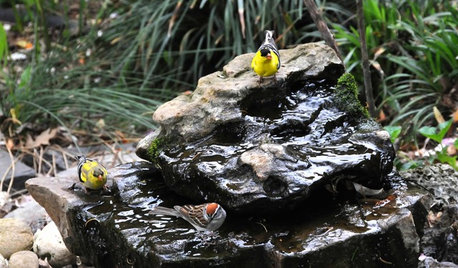
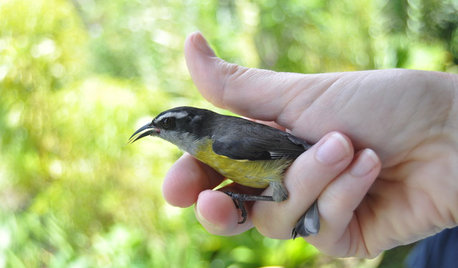
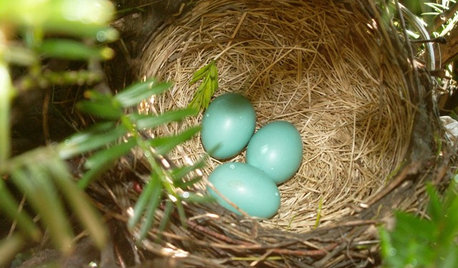
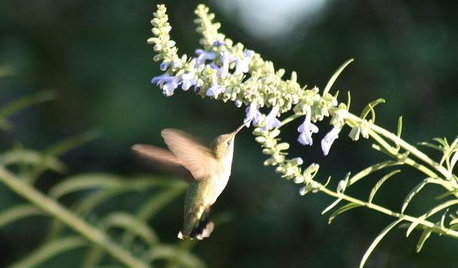









lisa11310